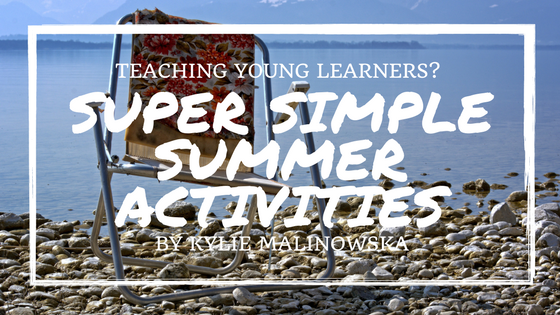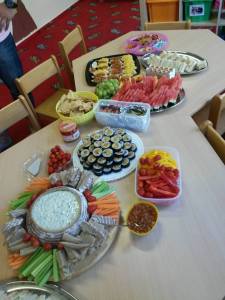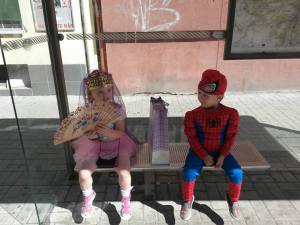
3 activities to whet your appetite – more to come!
It’s that time of year again when many of us TEFLers are off at a summer camp or summer school. Our goals tend to be more communicative, the atmosphere more relaxed, our learners more energised. We may also have additional activities like sports afternoons and drama clubs etc.
Are you teaching YL this summer?
Do you have…
- Large classes?
- Mixed Ability?
- High spirited kids on “holiday” with energy to burn?
- No time or energy for anything that isn’t super simple and super easy to prepare?
I’ve got you covered with these no-fuss, low(to no)-prep, faithful old favourites.
Port – Starboard
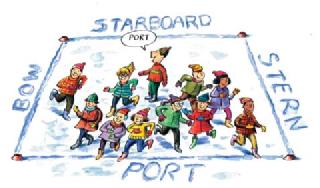
Picture source: https://www1.toronto.ca
What: Listen and do game
Who: Great for 7-11, but any age really
Resources needed: None, just space
As a kid this was one of my favourite games at summer camps. The basic premise is that a teacher/leader calls out prompts. The students do the appropriate action. E.g. leader calls out “port!” and the students run to the left of the room. Leader calls out “Starboard” and the students run to the right of the room etc. Last one to do the action is out. Last person standing is the winner. Simple. Adaptable. Fun. Super!
Upon googling this fabulous game I stumbled across this amazing resource , a list of different actions and extra ideas for the basic game.
I love the original game, but I love how the basic premise is so adaptable. Last week my 8 year old learners were doing animals and habitats but had so much energy to burn they could have run a marathon. We played our own version of port-starboard with connected animal and habitat vocabulary. It was a real hit!
Zombie

What: Vocabulary drilling with a difference
Who: 3-8 love it, but no reason you can’t go older.
Resources needed: Flashcards*
*Don’t have flashcards? No problem. Students could draw the pictures. Students could write the words on a slip of paper. No paper no pens? Also no problem. Students could choose an action and act out the word they are allocated (or choose).
The first time I did this with my pre-schoolers (as they were zombie obsessed) I had no idea it would become such a hit.
- All students stand in a circle facing other (but could equally be scattered around a room or garden). Each student has a flashcard.
- One student in the middle is the Zombie.
- The student in the middle holds their arms up like a zombie and walks toward any other student. But, they must chant the word for the card that student has over and over in a zombie like voice. e.g. “appppplleee….apppllleee…apppllleee”
- The child holding the apple card needs to say the name of another item being held up by another student.
- If the student says another word before the zombie reaches and touches them, the zombie must change directions and head for the new word, again, chanting the new word. If the zombie touches the student before they say one of the words another student is holding, they become the zombie.
Super easy. Super adaptable. Super fun.
Enjoy!
Fruit Salad
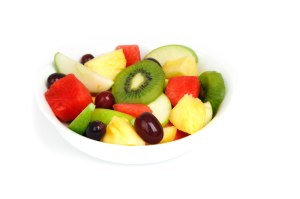
What: Vocabulary or grammar game
Who: All ages depending on how it’s adapted
Resources needed: Chairs
I think everyone knows this game, right? But maybe by a different name? It’s an oldie but a goody. and SO so easy to set up, play, adapt.
Students sit on chairs in a circle. There should be one fewer chairs than students and the student without a chair stands in the centre of the circle.
In the simplest version of the game the teacher would allocate different fruits to the children. e.g. walk around saying pear, banana, apple, orange, pear, banana, apple, orange until everyone is given a fruit. The child in the middle then calls out a fruit. e.g. “banana” and all the bananas must stand up and change seats. Meanwhile the child in the middle runs to an empty chair. The child left without a seat is the next to call out a fruit. for added fun, if the centre child calls out “fruit salad!“, EVERYONE must stand up and run.
I like to use this at the beginning of summer programmes to work out what learners can and can’t do. I get them to say anything at all about themselves and students, for whom the information is also true, get up and change. e.g. “I have a brother” “I like chocolate”.
It’s so easy to adapt. Anything from “Stand up if you’re wearing blue”, “I’ve never been to Paris”, to “This time next week I’ll be on holiday”. Vocabulary and structures practices are only limited by the teacher’s imagination.
Enjoy!
Extra
If you do have time for a bit more prep, here is a summer school/camp idea from last year. Especially good for dog lovers!
